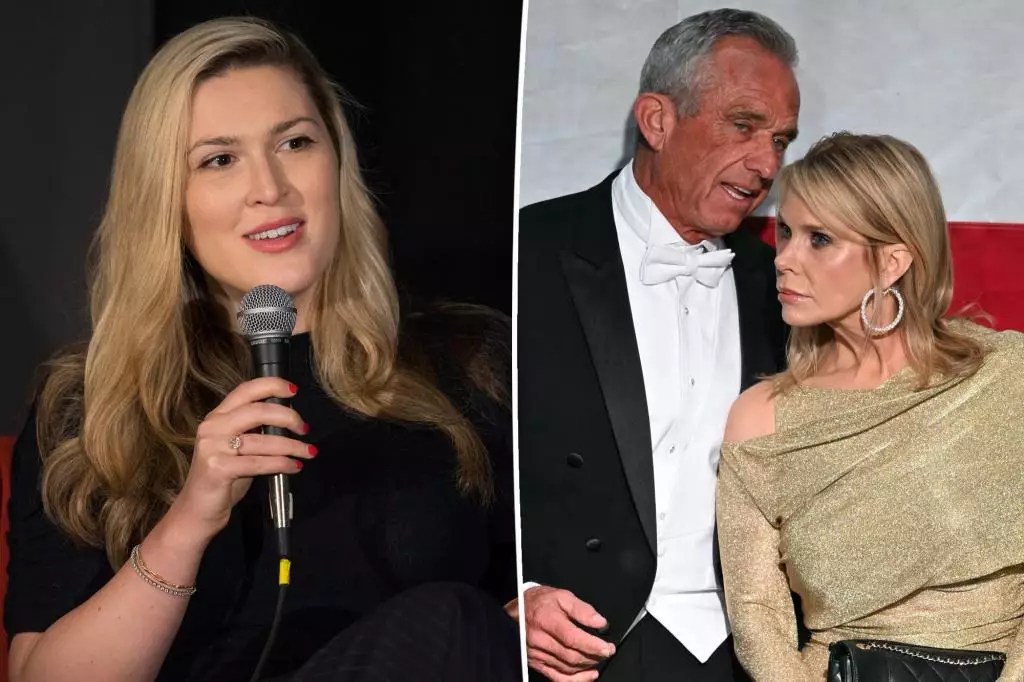Olivia Nuzzi, a prominent journalist for New York Magazine, has made her first public appearance since her entanglement in a high-profile sexting scandal involving Robert F. Kennedy Jr. Spotted at an exclusive event hosted by Argent, a prestigious fashion label, in Los Angeles, Nuzzi was surrounded by luminaries including actress Kate Mara and renowned director Ava DuVernay. Her choice of attire—a sharp black double-breasted suit adorned with a plunging neckline—reflected a confidence that belied the controversies swirling around her. This occasion, a gathering of influential women in the industry, took place at République, a chic French cuisine hotspot, illustrating that Nuzzi is attempting to reclaim her narrative amidst adversity.
Despite the ongoing turmoil stemming from her scandal, Nuzzi managed to portray an image of poise and sophistication. Adorned with eye-catching red nail polish and a tennis bracelet, she added a touch of allure with a stylish black bra subtly peeking from her suit jacket. Such visual elements signal that, even in the face of scandal, Nuzzi is determined to maintain her personal and professional identity. The gathering’s essence was emphasized in a public relations caption stating that “several of the world’s problems could probably have been solved in the warm glow of the República,” underlining the significance of powerful women coming together even in challenging times.
However, the backdrop to this glamorous affair is rife with dark undertones, mainly stemming from Nuzzi’s tumultuous relationship with her former fiancé, Politico reporter Ryan Lizza. Their ongoing legal struggles have cast a shadow over her public persona, as she seeks a no-contact order against him, alleging blackmail. The legal battle encapsulates the harsh realities of journalism, where personal lives intermingle with professional reputations. Lizza has vehemently denied the allegations, asserting that their engagement, which lasted from September 2022 until its abrupt termination in August 2023, was dissolved due to conflicts that escalated into personal threats being exchanged.
As Nuzzi navigates this tumultuous landscape, she stands accused of infidelity, with Lizza’s allegations revealing intimate details of her alleged affair with RFK Jr. Court documents have described the relationship in alarming terms, depicting it as a “toxic” entanglement riddled with complexities. While Nuzzi’s allegations against Lizza suggest a deeply personal betrayal, the accusations against RFK Jr. extend the reach of her scandal far beyond the confines of her relationship. Not only do they tarnish her reputation, but they also reveal the vulnerabilities of public figures who navigate the maelstrom of media scrutiny.
Moreover, Nuzzi’s reappearance raises questions about the double standards that exist in the media regarding scandal. Men often emerge from such controversies with their careers intact, while women like Nuzzi are scrutinized heavily and face professional repercussions. Nuzzi’s association with RFK Jr., who has also publicly denied their affair, complicates her standing within media circles. The ramifications extend to her workplace, where New York Magazine is currently investigating the incident that led to her being placed on leave. Such conditions highlight the precarious balance that female journalists must tread in a world where personal missteps can overshadow professional accomplishments.
Interestingly, RFK Jr. appears relatively unscathed in the public eye. Recent sightings of him holding hands with his wife, actress Cheryl Hines, suggest that he continues to maintain a robust public image, emphasizing the inconsistencies that mark gender perceptions in scandal. Hines’s public support juxtaposes the personal upheaval Nuzzi faces, raising poignant questions about the nature of loyalty, betrayal, and societal expectations surrounding relationships.
In the wake of her public appearance, Olivia Nuzzi stands at a crossroads, attempting to regain her footing in an environment shaped by scandal and betrayal. As she engages with prominent figures in the fashion and entertainment industries, she embodies a defiance—an unwillingness to be reduced to the circumstances surrounding her involved parties. Yet the weight of her experiences cannot be dismissed; the very act of stepping out post-scandal signifies a struggle for identity and resilience amid chaos.
As the saga continues to unfold, it remains to be seen how Nuzzi will navigate her path forward, whether she can emerge stronger from the turmoil or whether the shadows of her recent past will linger. The complexities of power, gender, and reputation in journalism will remain at play, further complicating her journey through this public struggle.


Leave a Reply